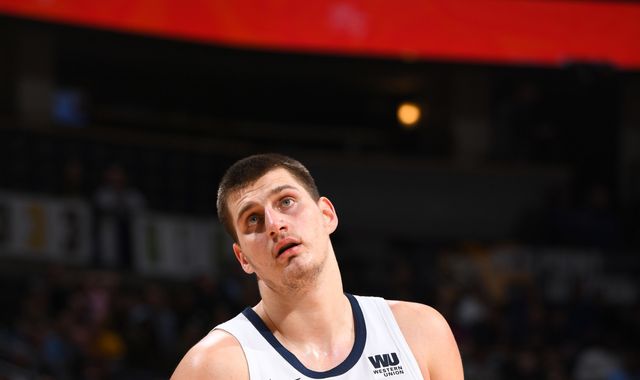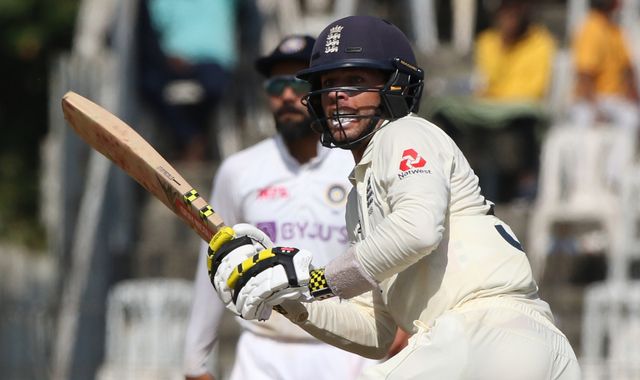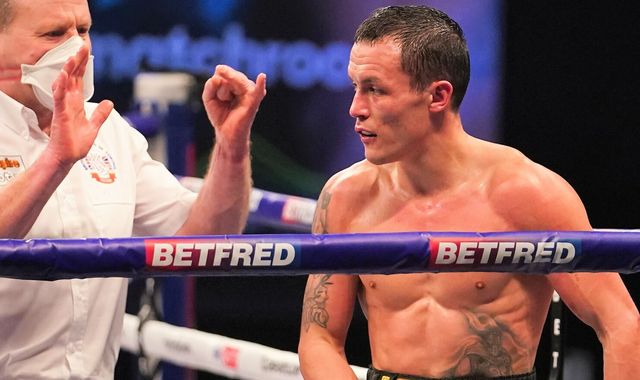Denver Nuggets need Nikola Jokic to be their go-to scorer – but does he want to?
Written by News on 20/04/2019
Trailing 2-1 to the Spurs, the Nuggets need Nikola Jokic to consistently embrace the role of go-to scorer. But does the Denver center want to? Sky Sports NBA analyst Mark Deeks examines the Nuggets’ quandary.

The NBA regular season is incredibly long. In slightly less than six months, teams pack in a hefty 82-game schedule, more than enough time to sort the wheat from the chaff.
The advantage of this from an analyst’s perspective is the large volume of information this volume gives us. The larger number of data points available, the larger the sample size, the more accurate the results. We can be far more confident a team really is that good when they win 55 out of 82 games as opposed to, say, 7 out of 10.
In the postseason, matters are slightly different. Playoff series are a maximum of a mere seven games long, and thus the first to four wins takes the series. Each individual game is therefore of a heightened significance, and, considering the importance of single-game variance, individual players need to step up, for the need for a larger sample size does not apply.
Compare this for example to the difference between league and cup football. Invariably, the Premier League is won by the team which proved to be the best week in week out over the course of nearly 10 months.
Yet in a competition with a straight elimination format, a team only must put together 90 good or lucky minutes to win matches in which they are heavily unfavoured. Therein lies the beauty of the FA Cup and the upset potential it brings.
The same sort of logic applies to the NBA postseason; while not single-game eliminations, the short nature of them makes them winnable for underdog teams.
The Denver Nuggets have entered their first-round series against the San Antonio Spurs as the higher seed by virtue of an excellent 54-28 regular season record, six games ahead of the Spurs at 48-34. It is enough to say they were better, albeit not by as much as their #2 versus #7 seedings would normally suggest – compare for example to the 58-versus-42 win totals differential in the Eastern Conference series between the Toronto Raptors and Orlando Magic.
To be better in the series though means only needing to win a few games. With a 2-1 lead after Game 3, the Spurs both have the upper hand in the series and homecourt advantage hereafter.
In losing Game 1, the Nuggets’ All-Star center Nikola Jokic attempted only nine shots and two free throws. In a situation as above in which big individual performances alone can be enough to swing the outcomes of series, Denver’s best player did not come up that big.
To be sure, he played well like he almost always does, recording a 10-point, 14-rebound, 14-assist triple-double. Yet the fact the last of those numbers is bigger than the former was telling.
Jokic’s passing vision, passing skill and unselfish mentality are unrivalled in the modern game. Some big men throughout NBA history have been comparably good of passers as he, but none are playing right now, and his 7.3 assists per game in the regular season was the ninth-highest mark in the league.
Unsurprisingly, the others ahead of him were all guards, and Jokic’s passes were often things of beauty. His passing ability is a gift.
So too though is his ability to score the ball on the low block. Jokic scores 1.027 points per possession in post-up plays, good for the 75th percentile league-wide on a much higher volume of attempts than those ahead of him, and while his jump shot is spottier, he hits enough perimeter attempts to be able to deter off-ball double teams, thus opening up this one-on-one coverage in the post. In said match-ups, he can score on anyone. The question is often whether or not he wants to.
Although they are deep, Denver’s roster construction necessitates that Jokic often be the go-to scorer rather than the go-to passer. No one else offers the consistency he does.
Point guard Jamal Murray is particularly inconsistent, and while the upside of Murray’s feast-or-famine nature (and unnerving ability to combine missed open looks with made contested ones) has its upsides such as his season-saving late-game shooting performance that swung the outcome of Game 2, the resultant lulls also leave big holes in the team’s offense to fill.
Shooting guard Gary Harris has been far from his best since returning from injury and is a shadow of his former self currently. Power forward Paul Millsap is best served in a complementary role. Although starting small forward Will Barton has spent the half-season he has managed since his own return from injury trying to play like Kobe Bryant, intent does not equal results. If anything, his offensive aggression and knack for early shot clock momentum-swinging pull-ups deflates his own team more than the opposition.
Because of Denver’s depth, there are some options off the bench when it comes to scoring and shooting. Third-year combo forward Juancho Hernangomez has rediscovered his shot after it took the year off last season, and sophomore wing Torrey Craig showed his aggression around the basket in the Game 3 loss.
Second-year point guard Monte Morris is a bastion of offensive efficiency that pairs well with ‘Scoring Jokic’, and reserve wing Malik Beasley has emerged as one of the league’s absolute best shooting threats. Shooting 45.9 per cent on spot-up attempts (good for a 62.5 per cent effective field goal percentage, a metric that incorporates the added value of three-point attempts compared to twos), Beasley is a 93rd percentile shooter in this category alone, and has shown tremendous growth in knowing how to get open in the first place.
These, though, are all complementary pieces to a star talent whose gravitational effect on the defense avails them the space to get theirs. Or at least, they are when the star talent wants that.
Surrounding Jokic with shooters, in theory, makes for quite the potent offensive unit. In Game 1, however, the Nuggets shot only 6-of-25 from three-point range as a team, and although the much-improved 15-29 three-point shooting as a team (buoyed by 5-of-6 from Beasley and an uncharacteristic 3-of-6 from Jokic himself) in the Game 3 loss was a bright spot, the Nuggets as a team are a middle-of-the-pack shooting unit. On the regular season as a whole, Denver ranked 17th in three-point percentage, and 18th in total makes.
The question is not only how much does Jokic want to do, but also how much can he do. Conditioning has been a factor in his career, and in Game 1 he continued a career-long trend to be particularly pass-first in clutch situations, perhaps because of this conditioning issue.
The struggles of reserve center Mason Plumlee over the last six weeks have not helped as they only add to Jokic’s workload, particularly defensively. Nor has the profound season-long struggles of reserve big Trey Lyles, who has lost his shot all season, and with it much of his impact on the game.
There is a good argument for playing Millsap at center more to spot Jokic and open up space for another shooter; however, this nor any other single contributing factor changes the fact that, at times, Jokic has been passive about his own scoring talents to a fault.
Credit for this goes in part to the Spurs’ defensive schemes, which have seen disciplined doubles thrown his way and urged him to become a passer, something a basketball mind such as Jokic’s that has been honed to trying to find the most open player possible defaults to doing.
Fault for it also goes in part to the Nuggets’ own supporting cast for not finding him in the paint enough, or working to do so rather than trying to create space off the dribble for jump shots needlessly.
Nevertheless, as things stand, Denver’s offensive player is only third on the team in shot attempts, and only seventh out of the nine rotation players in field goal attempts per 36 minutes. Even the limited talents of Craig are ahead of him in this category.
When the Spurs are so willing to let Jokic pass for 9.7 postseason assists per game as a part of their deliberate strategy to pull the upset, that should be quite telling.
Watch Game 4 of the Denver Nuggets vs San Antonio Spurs first-round playoff series via a free live stream on skysports.com, the Sky Sports mobile app and Sky Sports’ Youtube channel.
(c) Sky News 2019: Denver Nuggets need Nikola Jokic to be their go-to scorer – but does he want to?







